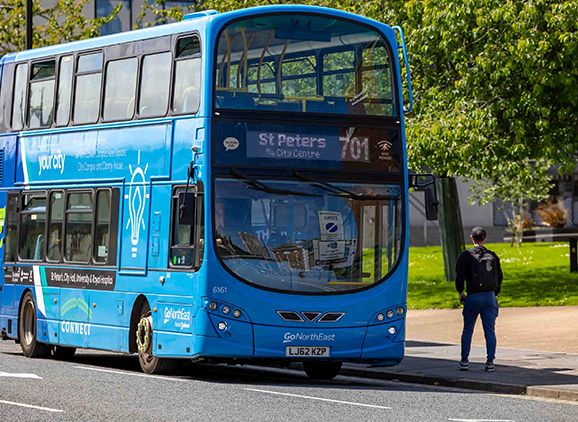It is widely acknowledged that climate change poses an existential threat to humanity due to its predicted impact on health, society, and the economy. Universities are uniquely placed to play a key role in overcoming the threats posed by climate change and other environmental and social challenges.
The research and technologies required to transform the world, and the knowledge and skills needed to implement them, is being developed within universities, including the University of Sunderland.
We can also play a vital role in ensuring that we contribute to a just transition to a sustainable future, one that maximises opportunities for the people of Sunderland, and the North East of England.
The University is acutely aware of the potential environmental impact of its activities and aims to ensure that these are managed in a sustainable way, having due regard to environmental, social and economic considerations.
Guided by our values of being Student-Focused, Professions-Facing and Society-Shaping, we will ensure that sustainability is embedded in all aspects of our university, from our built environment, through to the resources we use, and the courses we deliver.
Scope
This policy applies to staff, students and visitors to the University, who are studying or working at campuses in the UK.
We are committed to:
- Embedding sustainability at all levels and all disciplines of the institution, including in all of the University's strategic plans.
- Striving for excellence, regularly reviewing best practice and continual improvement.
- Transparent and accurate sustainability reporting.
- Providing the necessary resources to deliver the commitments in this policy and related strategies.
- Delivering a net zero-carbon estate by 2040 – where we minimise the carbon we produce through our day-to-day operations.
- Protecting wildlife and increasing biodiversity to create outdoor spaces that are healthy, welcoming spaces for people and nature.
- Reducing water consumption and incorporating technology to monitor and detect leaks.
- Fulfilling environmental obligations to protect environment and prevent pollution through the implementation of the Eco Campus Environmental Management System.
- Zero waste to landfill and disposing of all waste in line with the waste hierarchy.
- Raising awareness of the environmental agenda with staff and students through regular communications and engagement.
- Collaborating with the local community, and other local organisations to protect and enhance the environment.
- Being thoughtful about the things we buy and use; including what happens to those things when we have finished with them, the suppliers we use and how they contribute to a more sustainable future.
- Ensuring we buy from suppliers with the same values as us and implement policies that enable us to make more sustainable choices.
- Campuses that are well connected to active and sustainable modes of transport.
- Thoroughly embedding sustainability into the curriculum through teaching, experiences and assessment in all programmes, to ensure that all students can contribute to a sustainable future whatever career they choose.
- Ensuring our research contributes to a just transition to a sustainable future, maximising opportunities for the city and region.
- Ensuring that environmental requirements are incorporated during the design, development and refurbishment of the estate, and that all new builds aim for Net Zero carbon and are designed for future climate scenarios.
- Adapting the University estate to be resilient in a changing climate.
Version Control
Date: 12/12/2024
Version: 1.0
Author: Laura Middlemass
Authorised by: Strategic Environmental Sustainability Group
Review Date: December 2025



